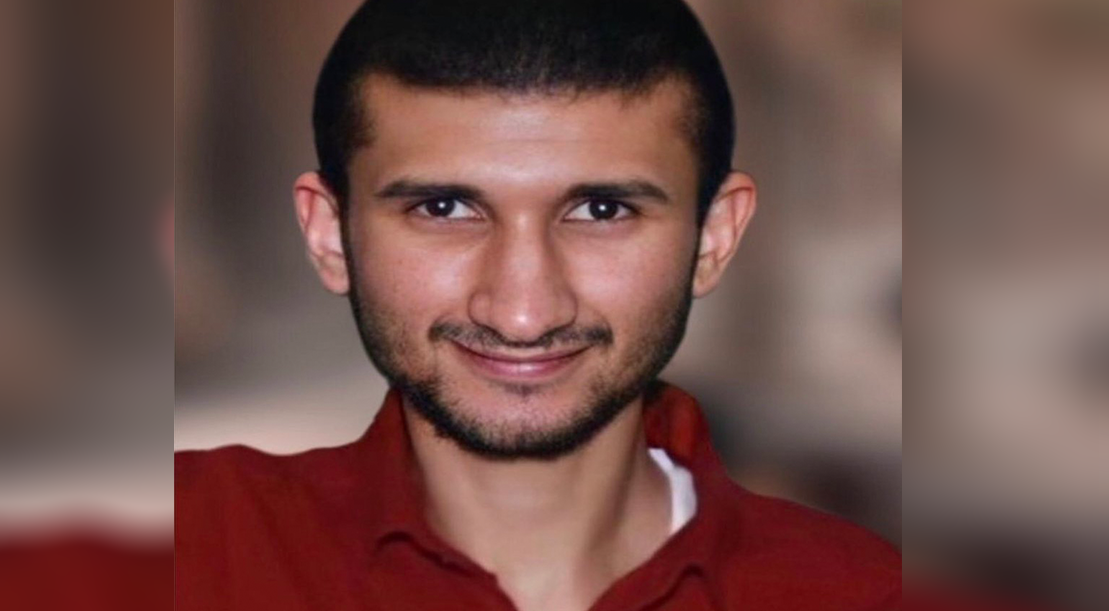Ahmed Jaber Radhi is a 24-year-old Bahraini citizen from Jidhafs who used to work as a restaurant accountant before his arrest in August 2018. Wrongfully accused of engaging in terrorist activity despite presenting exculpatory evidence, Ahmed was convicted and sent to Jau Prison to carry out his sentence. There, he contracted COVID-19 as a result of the prison’s inability to contain the outbreak of the virus.
On 8 August 2018, at dawn, riot police and officers in civilian clothing broke into Ahmed’s family house. The officers confiscated Ahmed’s phone and seized the phones of his sister and father before arresting him without stating any reason for his arrest nor presenting an arrest warrant. Soon after his arrest, Ahmed was allowed to call his uncle very briefly to inform him that he was at the Criminal Investigations Directorate (CID). After that call, Ahmed’s family did not receive news of him and could not contact him for three weeks.
During those three weeks, CID officers interrogated Ahmed without his lawyer at various locations that he could not recall. The officers tortured, beat, and mistreated him during the interrogation period in an attempt to extract confessions to the charges made against him, but Ahmed did not confess.
On 13 December 2018, Ahmed was convicted of 1) training in Iraq on the use of weapons and explosives in order to use them with the intention of committing terrorist crimes, and 2) receiving money from a group that undertakes terrorist activity in order to use it in conducting such activity and to spend it on the families of several prisoners in criminal cases. Despite presenting his passport in court to prove that he did not travel to Iraq, he was sentenced to 10 years in Jau Prison, was fined 100,000 Bahraini Dinars, and his nationality was revoked. However, it was later reinstated by royal pardon. The court judgement against Ahmed was upheld by both the Court of Appeals and the Court of Cassation on 28 May 2019 and 27 July 2020, respectively.
Since the start of the COVID-19 pandemic and especially since the virus outbreak in Jau Prison, visits to the prison have been suspended and replaced by irregular and short video calls with family members. On 27 March 2021, Ahmed’s family found out, through the Ministry of Health application, that he had tested positive for COVID-19. The next day, on 28 March 2021, Ahmed’s family received a call from the Health Ministry to inform them of their son’s infection with COVID-19 and inquired about the people whom he lives with and had contact with. The Health Ministry employee was unaware that Ahmed is a prisoner until the family clarified that he was an inmate at Jau Prison. Ahmed was able to call his family on 29 March 2021, and he sounded sick and tired.
He told them that after contracting the virus, he was moved from Building 20 to Building 18 of Jau Prison where he was held in a cell with five other inmates. A week later, on 5 April 2021, Ahmed was tested again for COVID-19 and his results were negative. On the same day, he called his family, and his voice sounded much better than the last call. During the time period that he was ill with COVID-19, Ahmed received minimal medical care and treatment, which mostly consisted of Paracetamol, he was locked inside his cell 24 hours a day, and he was not allowed to go out for fresh air. Moreover, before the outbreak inside the prison, inmates were not given any sanitary products or masks, and even now, they are only given masks when they have to leave their cell or the prison for a visit or a phone call.
Bahraini authorities’ treatment of Ahmed, from his arbitrary arrest without a warrant, to his denial of fair trial rights, torture, ill-treatment, and denial of proper medical care and assistance, all constitute violations of Bahrain’s obligations under the Bahraini Constitution and under international treaties, namely the Convention against Torture and Other Cruel, Inhuman or Degrading Treatment or Punishment (CAT) and the International Covenant on Civil and Political Rights (ICCPR). ADHRB therefore urges authorities to drop his conviction made through an unfair trial and to grant Ahmed a retrial respecting international judicial and evidentiary standards, and to investigate claims of inhumane and ill-treatment in order to hold prison officials accountable. Finally, ADHRB calls upon Bahraini authorities to respect basic standards of hygiene and sanitation to make sure that Ahmed is no longer exposed on a daily basis to the risk of contracting COVID-19 again, among other illnesses, viruses and infections.





